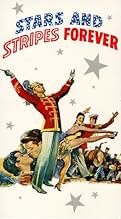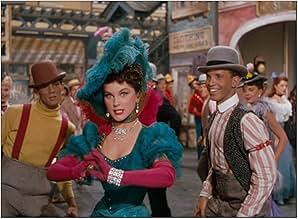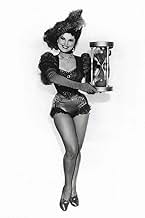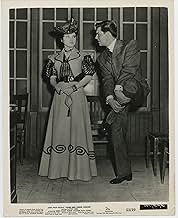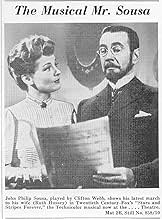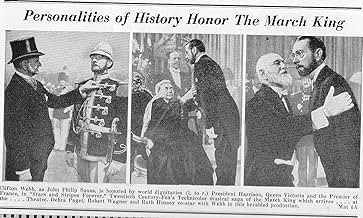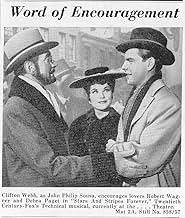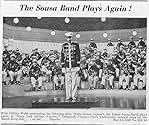NOTE IMDb
7,1/10
1 k
MA NOTE
Ajouter une intrigue dans votre langueA film biography of the composer John Philip Sousa, from his early days in the Marine Corps Band through the Spanish-American War in 1898.A film biography of the composer John Philip Sousa, from his early days in the Marine Corps Band through the Spanish-American War in 1898.A film biography of the composer John Philip Sousa, from his early days in the Marine Corps Band through the Spanish-American War in 1898.
- Réalisation
- Scénario
- Casting principal
- Récompenses
- 3 nominations au total
Thomas Browne Henry
- David Blakely
- (as Tom Browne Henry)
Frank Ferguson
- Mr. Wells
- (scènes coupées)
Aladdin
- Orchestra Conductor
- (non crédité)
- …
Bill Alcorn
- Specialty Dancer
- (non crédité)
Sharon Jan Altman
- Helen Sousa
- (non crédité)
Jon Andrews
- Minor Role
- (non crédité)
John Baer
- Chorus Boy at 'El Capitan' Rehearsal
- (non crédité)
Barbara Bailey
- Dancer
- (non crédité)
Patricia Barker
- Minor Role
- (non crédité)
Alvin Beam
- Minor Role
- (non crédité)
Bobker Ben Ali
- Reporter
- (non crédité)
Avis à la une
John Philip Sousa's position in American (and World) music is set in stone by now. Others have composed great marches (the English composer Edward Elgar with his four "Pomp and Circumstance Marches" for instance, two of which are memorable), and such major composers like Wagner and Mendelsohn. But Sousa remains the "March King". Like Johann Strauss the Younger, Alexander Scarlatti, and Scott Joplin, he is recalled for his domination of a single area of music: marches in this case, rather than waltzes, sonatas, or "rags". But this really does not explain why he remains the "March King". There is a sense of fun and spirit in Sousa's marches that transcend what a march is usually supposed to do.
Marches were originally meant for troops to walk in step either on a training field or on the battlefield (music was used until the end of the 19th Century to keep up the spirits of the soldiers, and even to help orchestrate the speed they were to fight at when running across the battlefield). Sousa came from a musical family (his father was a musician in the Marine Corps band). Sousa followed in his father's footsteps, but played several instruments and rose to be the bandmaster. He began composing pieces for the Marine Corps Band, such as "Semper Fidelis", "The Washington Post March", "Manhattan Beach", and he tried to expand his abilities into other fields. When he left the Marine Corps, he formed his own band, which he developed with a perfect balance of brass, stings, percussion, and woodwinds. His band would go around the world performing, not only his own pieces, but also other composers as well.
The movie does touch, once or twice, on Sousa's attempts to broaden his musical ability by doing Broadway shows (operettas). At the start Clifton Webb, as Sousa, does play the melody of "Semper Fidelis" for his wife Jenny (Ruth Hussey) as a tune to be sung. It doesn't quite work. He would do a successful operetta (which is still revived) called EL CAPITAN, which starred DeWolf Hopper (we hear an actor as Hopper singing a tune at a rehearsal during the movie). However, EL CAPITAN had a book by Charles Klein, a major dramatist of the 1890s - 1915 (he drowned in the Lusitania disaster). Klein was not a W. S. Gilbert, but his libretto was serviceable. Unfortunately Sousa never had another librettist/lyricist like Klein, and spent the rest of his career seeking his "Gilbert". As a result the leading operetta composer from the U.S. in Sousa's lifetime (and since) was Victor Herbert.
Sousa was talented in other ways too. He sometimes wrote clever lyrics to comic songs, such as "A Typical Song of Zanzibar". He wrote about five comic novels too. He designed the special marching tuba, the "Sousaphone" (which is shown in the film being designed by Webb and Robert Wagner). But it is the string of great marches that he left which are his great donation to our culture. The reason is more than just his gift for melodious music. He was a genius at composition and orchestration - probably the best orchestrator among the major American composers.
His best remembered march is the title march for this film: THE STARS AND STRIPES FOREVER. The film mentions how Sousa, on a trip for his health, was walking the deck of the liner at night and thought of the beat of the music. We hear Webb describing the moment (quoting a passage from Sousa's memoirs, MARCHING ALONG), and the film ends with the playing of the great march. The film does not mention that that Sousa also composed words to be sung to it (which occasionally still are sung). A few years ago, the U.S. Congress formally adopted THE STARS AND STRIPES FOREVER as the national march.
I have gone into a great deal of detail regarding Sousa and his career, for the movie (for a biography) skims a lot. His literary efforts are not dealt with, and the film ends (really) with the playing of THE STARS AND STRIPE FOREVER. That was in 1899. Sousa would live until 1932, and would be a public figure until then. He was still composing until the 1920s.
Webb had an extensive musical comedy career in the 1920s and 1930s (he was one of the stars in Irving Berlin's AS THOUSANDS CHEER, for example). But aside from an occasional tune he sings like "When I wore a Tulip" or a dance he does with Jeanne Craig in CHEAPER BY THE DOZEN, he never did a musical. STARS AND STRIPES FOREVER is his one "musical film". He is credible as Sousa, but the film never really goes deeply into the great man. The dramatic portions are handled by Robert Wagner and Deborah Paget as friends and lovers, whose love affair is twisted for awhile by the Spanish American War. The film is certainly watchable (the cast is game, and the music is first rate) but it is not a showcase for Webb's talents in musicals. Ironically he could have been in Vincent Minelli's THE BANDWAGON with Fred Astaire and Cyd Charisse, but opted for the lead as Sousa. Probably a bad decision - but it is hard to say. Every July 4th STARS AND STRIPES FOREVER is shown for it's great holiday music. What we lost in not seeing Webb opposite Astaire is not enough to prevent our still seeing Webb as the great maestro composer.
Marches were originally meant for troops to walk in step either on a training field or on the battlefield (music was used until the end of the 19th Century to keep up the spirits of the soldiers, and even to help orchestrate the speed they were to fight at when running across the battlefield). Sousa came from a musical family (his father was a musician in the Marine Corps band). Sousa followed in his father's footsteps, but played several instruments and rose to be the bandmaster. He began composing pieces for the Marine Corps Band, such as "Semper Fidelis", "The Washington Post March", "Manhattan Beach", and he tried to expand his abilities into other fields. When he left the Marine Corps, he formed his own band, which he developed with a perfect balance of brass, stings, percussion, and woodwinds. His band would go around the world performing, not only his own pieces, but also other composers as well.
The movie does touch, once or twice, on Sousa's attempts to broaden his musical ability by doing Broadway shows (operettas). At the start Clifton Webb, as Sousa, does play the melody of "Semper Fidelis" for his wife Jenny (Ruth Hussey) as a tune to be sung. It doesn't quite work. He would do a successful operetta (which is still revived) called EL CAPITAN, which starred DeWolf Hopper (we hear an actor as Hopper singing a tune at a rehearsal during the movie). However, EL CAPITAN had a book by Charles Klein, a major dramatist of the 1890s - 1915 (he drowned in the Lusitania disaster). Klein was not a W. S. Gilbert, but his libretto was serviceable. Unfortunately Sousa never had another librettist/lyricist like Klein, and spent the rest of his career seeking his "Gilbert". As a result the leading operetta composer from the U.S. in Sousa's lifetime (and since) was Victor Herbert.
Sousa was talented in other ways too. He sometimes wrote clever lyrics to comic songs, such as "A Typical Song of Zanzibar". He wrote about five comic novels too. He designed the special marching tuba, the "Sousaphone" (which is shown in the film being designed by Webb and Robert Wagner). But it is the string of great marches that he left which are his great donation to our culture. The reason is more than just his gift for melodious music. He was a genius at composition and orchestration - probably the best orchestrator among the major American composers.
His best remembered march is the title march for this film: THE STARS AND STRIPES FOREVER. The film mentions how Sousa, on a trip for his health, was walking the deck of the liner at night and thought of the beat of the music. We hear Webb describing the moment (quoting a passage from Sousa's memoirs, MARCHING ALONG), and the film ends with the playing of the great march. The film does not mention that that Sousa also composed words to be sung to it (which occasionally still are sung). A few years ago, the U.S. Congress formally adopted THE STARS AND STRIPES FOREVER as the national march.
I have gone into a great deal of detail regarding Sousa and his career, for the movie (for a biography) skims a lot. His literary efforts are not dealt with, and the film ends (really) with the playing of THE STARS AND STRIPE FOREVER. That was in 1899. Sousa would live until 1932, and would be a public figure until then. He was still composing until the 1920s.
Webb had an extensive musical comedy career in the 1920s and 1930s (he was one of the stars in Irving Berlin's AS THOUSANDS CHEER, for example). But aside from an occasional tune he sings like "When I wore a Tulip" or a dance he does with Jeanne Craig in CHEAPER BY THE DOZEN, he never did a musical. STARS AND STRIPES FOREVER is his one "musical film". He is credible as Sousa, but the film never really goes deeply into the great man. The dramatic portions are handled by Robert Wagner and Deborah Paget as friends and lovers, whose love affair is twisted for awhile by the Spanish American War. The film is certainly watchable (the cast is game, and the music is first rate) but it is not a showcase for Webb's talents in musicals. Ironically he could have been in Vincent Minelli's THE BANDWAGON with Fred Astaire and Cyd Charisse, but opted for the lead as Sousa. Probably a bad decision - but it is hard to say. Every July 4th STARS AND STRIPES FOREVER is shown for it's great holiday music. What we lost in not seeing Webb opposite Astaire is not enough to prevent our still seeing Webb as the great maestro composer.
Although it probably only has the most tenuous connection with the actual John Philip Sousa's home life this is a highly enjoyable even rousing biography of the famed musician and band leader.
Clifton Webb is such spot on casting as Sousa from his resemblance to the man through his clipped speak and regal bearing it almost seems as if Sousa was invented for him expressly. Ruth Hussey is terrific fun as Mrs. Sousa, sassy and tart but displaying infinite patience for her persnickety husband. The two of them make a great pair showing in subtle ways that even though they have small habits that drive each other crazy there was a deep love the couple shared over the years.
In a fabricated subplot Robert Wagner and Debra Paget, both almost supernaturally beautiful, as a young musician and the music hall entertainer that he loves are bursting with vitality and youthful exuberance.
All of them are highly engaging but it's really the music that the film is about and it's stuffed from one end to the other with classic Sousa marches and his other compositions. The film is bandbox pretty, every frame practically pulsates with ultra bright Technicolor. There is one somber passage where the war touches all the main characters lives but overall the movie is a cheery experience and leaves you in a toe tapping upbeat mood at its conclusion.
A most satisfying diversion especially for lovers of marching music.
Clifton Webb is such spot on casting as Sousa from his resemblance to the man through his clipped speak and regal bearing it almost seems as if Sousa was invented for him expressly. Ruth Hussey is terrific fun as Mrs. Sousa, sassy and tart but displaying infinite patience for her persnickety husband. The two of them make a great pair showing in subtle ways that even though they have small habits that drive each other crazy there was a deep love the couple shared over the years.
In a fabricated subplot Robert Wagner and Debra Paget, both almost supernaturally beautiful, as a young musician and the music hall entertainer that he loves are bursting with vitality and youthful exuberance.
All of them are highly engaging but it's really the music that the film is about and it's stuffed from one end to the other with classic Sousa marches and his other compositions. The film is bandbox pretty, every frame practically pulsates with ultra bright Technicolor. There is one somber passage where the war touches all the main characters lives but overall the movie is a cheery experience and leaves you in a toe tapping upbeat mood at its conclusion.
A most satisfying diversion especially for lovers of marching music.
What should be understood is that Stars and Stripes Forever is in no way a full biography of the famous March King which was the nickname given to John Philip Sousa. It is rather a portrait of the era known as the Gay Nineties in America where Sousa first achieved his reputation and prominence. Also included is a romance between fictional characters played by Robert Wagner and Debra Paget.
In that beard with those pince nez glasses, Clifton Webb looks remarkably like John Philip Sousa in that period and by reputation, Sousa was as much a dilettante as Webb normally played on screen which made him perfect casting. After leaving the Marine Corps band, Sousa formed his own orchestra which became world famous and toured the globe well into the Twenties.
But our story concerns Sousa the March King. Though he composed all kinds of music, it is his marches that have come down today and have given him his reputation. The Marine Corps official march, Semper Fidelis, was composed by Sousa and the incident involving President Benjamin Harrison as depicted in Stars and Stripes Forever is somewhat true. The Marine Corps Band was playing at a White House reception and the Harrison who was not the most social of presidents ordered Sousa to speed up the tempo so the receiving line would move at a brisk pace.
Ruth Hussey is cast in the Myrna Loy type role of the perfect understanding mate for her genius husband and she fulfills the role admirably. Even Clifton Webb does make you forget you're watching Clifton Webb and you do think you are seeing the real Sousa.
Stars and Stripes Forever is an admirable film and of course the finale does have several bands and marching armed forces personnel playing and marching to Sousa's most famous composition.
In that beard with those pince nez glasses, Clifton Webb looks remarkably like John Philip Sousa in that period and by reputation, Sousa was as much a dilettante as Webb normally played on screen which made him perfect casting. After leaving the Marine Corps band, Sousa formed his own orchestra which became world famous and toured the globe well into the Twenties.
But our story concerns Sousa the March King. Though he composed all kinds of music, it is his marches that have come down today and have given him his reputation. The Marine Corps official march, Semper Fidelis, was composed by Sousa and the incident involving President Benjamin Harrison as depicted in Stars and Stripes Forever is somewhat true. The Marine Corps Band was playing at a White House reception and the Harrison who was not the most social of presidents ordered Sousa to speed up the tempo so the receiving line would move at a brisk pace.
Ruth Hussey is cast in the Myrna Loy type role of the perfect understanding mate for her genius husband and she fulfills the role admirably. Even Clifton Webb does make you forget you're watching Clifton Webb and you do think you are seeing the real Sousa.
Stars and Stripes Forever is an admirable film and of course the finale does have several bands and marching armed forces personnel playing and marching to Sousa's most famous composition.
10lawprof
John Philip Sousa was not only America's "March King," he was a skilled organizer and entertainer who also composed much music now thoroughly unknown to most Americans (and fans elsewhere). His life spanned the era of an optimistic, brash America where live music was the only music to the burgeoning and eventually triumphant victory of an insatiable technology that even in Sousa's lifetime was employed to record almost everything. Sousa benefited from the new world of recording and he can be heard on compact disc in his later years conducting his famed quasi-military band.
20th Century Fox enlisted a cadre of fine performers for a seamlessly entertaining biopic of John Philip Sousa with a nice, anachronistically innocent, fictional romance interwoven with the band leader/composer's story.
As Sousa Clifton Webb brings to life a character who was, as in reality, ambitious and driven to succeed. Sousa left the Marine Corps, where he led The President's Own, to start his hand-picked band. In uniforms which the leader designed, the outfit mirrored great military bands (of which the U.S., as opposed to England, had a clear shortage during Sousa's life). Sousa understood the importance of touring and he was light years ahead of the twentieth century's pops ensembles in making his musicians - and his music - as ubiquitous as travel of his day allowed.
Sousa's patient and adoring wife, Jennie, is well played by Ruth Hussey.
A nice romantic plot is the courtship of aspiring singer Lily Becker and the alleged inventor of the sousaphone, Willie Little. Lily is the gorgeous Debra Paget and Willie the young and upcoming Robert Wagner. Neither character existed in real life but their romance is well threaded into Sousa's story and is coyly affecting.
1952 was a hard year for many Americans. A self-designated lame duck president presided over an unpopular war, the first in our history in which victory in the traditional military sense wasn't a strategic or political objective. "The Stars and Stripes Forever" was a refreshing patriotic film that didn't require thinking about the realities of the day. I remember seeing it as a kid and loving every minute. I still watch it occasionally.
Credit also goes to the producer and to director Henry Koster for including a scene at an Atlanta festival where a black chorus sings The Battle Hymn of the Republic under Sousa's baton right after a rousing version of Dixie was performed. This was two years before Brown v. Board of Education, the Supreme Court's belated start of the final assault on the obscenity of legalized racial discrimination. I doubt everyone in the South felt good about that scene.
Musical pieces are well interwoven with the story and the final minutes have Sousa's most famous march, also the movie's title, played with a segue from his band to contemporary marching marines and soldiers. His superimposed spectral leading is a fine reminder of his role. A very nice touch.
Folks who only know Sousa from a relative handful of oft-performed and wonderful marches should check out his less well-known music. NAXOS is currently releasing a series of CDs of works that reflect Sousa's extraordinary creativity. But above all, Americans owe him an everlasting debt for composing stirring music that still animates listeners as it did when first performed under his baton.
10/10
20th Century Fox enlisted a cadre of fine performers for a seamlessly entertaining biopic of John Philip Sousa with a nice, anachronistically innocent, fictional romance interwoven with the band leader/composer's story.
As Sousa Clifton Webb brings to life a character who was, as in reality, ambitious and driven to succeed. Sousa left the Marine Corps, where he led The President's Own, to start his hand-picked band. In uniforms which the leader designed, the outfit mirrored great military bands (of which the U.S., as opposed to England, had a clear shortage during Sousa's life). Sousa understood the importance of touring and he was light years ahead of the twentieth century's pops ensembles in making his musicians - and his music - as ubiquitous as travel of his day allowed.
Sousa's patient and adoring wife, Jennie, is well played by Ruth Hussey.
A nice romantic plot is the courtship of aspiring singer Lily Becker and the alleged inventor of the sousaphone, Willie Little. Lily is the gorgeous Debra Paget and Willie the young and upcoming Robert Wagner. Neither character existed in real life but their romance is well threaded into Sousa's story and is coyly affecting.
1952 was a hard year for many Americans. A self-designated lame duck president presided over an unpopular war, the first in our history in which victory in the traditional military sense wasn't a strategic or political objective. "The Stars and Stripes Forever" was a refreshing patriotic film that didn't require thinking about the realities of the day. I remember seeing it as a kid and loving every minute. I still watch it occasionally.
Credit also goes to the producer and to director Henry Koster for including a scene at an Atlanta festival where a black chorus sings The Battle Hymn of the Republic under Sousa's baton right after a rousing version of Dixie was performed. This was two years before Brown v. Board of Education, the Supreme Court's belated start of the final assault on the obscenity of legalized racial discrimination. I doubt everyone in the South felt good about that scene.
Musical pieces are well interwoven with the story and the final minutes have Sousa's most famous march, also the movie's title, played with a segue from his band to contemporary marching marines and soldiers. His superimposed spectral leading is a fine reminder of his role. A very nice touch.
Folks who only know Sousa from a relative handful of oft-performed and wonderful marches should check out his less well-known music. NAXOS is currently releasing a series of CDs of works that reflect Sousa's extraordinary creativity. But above all, Americans owe him an everlasting debt for composing stirring music that still animates listeners as it did when first performed under his baton.
10/10
I've seen Stars and Stripes Forever after more than forty years. It stands as an agreeable, happy musical, and the only musical biopic that I know, that doesn't falsify the man. The John Philip Sousa of the movie is the real John Philip Sousa. And Clifton Webb gave here his more mature and less hackneyed performance.
Le saviez-vous
- AnecdotesAccording to Paul Bierley's biography of John Philip Sousa, "John Philip Sousa, American Phenomenon", several musicians who had played under Sousa attended the world premiere of the film but walked out in disgust.
- GaffesIn the film the famous Sousaphone was invented by Willy Little. In actuality the first sousaphone was developed by James Welsh Pepper in 1893 at the request of John Philip Sousa.
- Citations
John Philip Sousa: What in the name of all get out's been keeping you so long?
Jennie Sousa: I was hearing the children's prayers.
John Philip Sousa: Does that take all night?
Jennie Sousa: They were praying for you.
- Crédits fousDuring the opening display of 20th Century Fox's logo, Sousa's "Semper Fidelis" was played instead of the usual 20th Century fanfare
- Versions alternativesSome releases include at the end a clip of the real John Philip Sousa leading the band in one of his famous marches.
- ConnexionsFeatured in Family Classics: Family Classics: Stars and Stripes Forever (1963)
- Bandes originalesSemper Fidelis
(uncredited)
Music by John Philip Sousa (1888)
Played during the opening credits
Also played by the Marine band at the presidential reception
Meilleurs choix
Connectez-vous pour évaluer et suivre la liste de favoris afin de recevoir des recommandations personnalisées
- How long is Stars and Stripes Forever?Alimenté par Alexa
Détails
- Date de sortie
- Pays d’origine
- Langue
- Aussi connu sous le nom de
- Stars and Stripes Forever
- Lieux de tournage
- Société de production
- Voir plus de crédits d'entreprise sur IMDbPro
- Durée1 heure 30 minutes
Contribuer à cette page
Suggérer une modification ou ajouter du contenu manquant

Lacune principale
By what name was La parade de la gloire (1952) officially released in India in English?
Répondre
